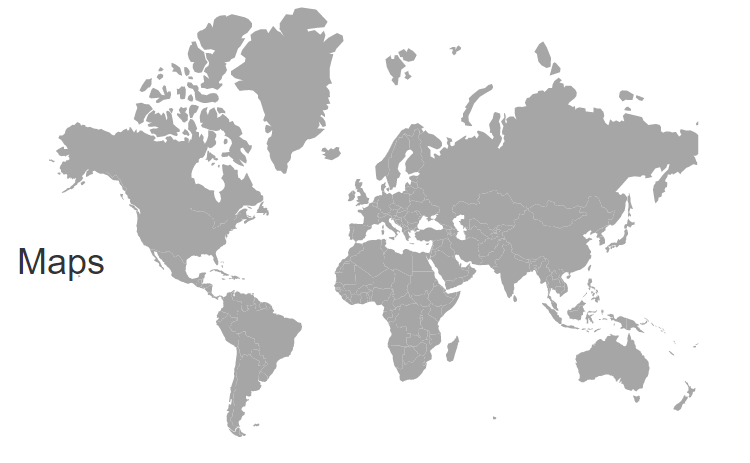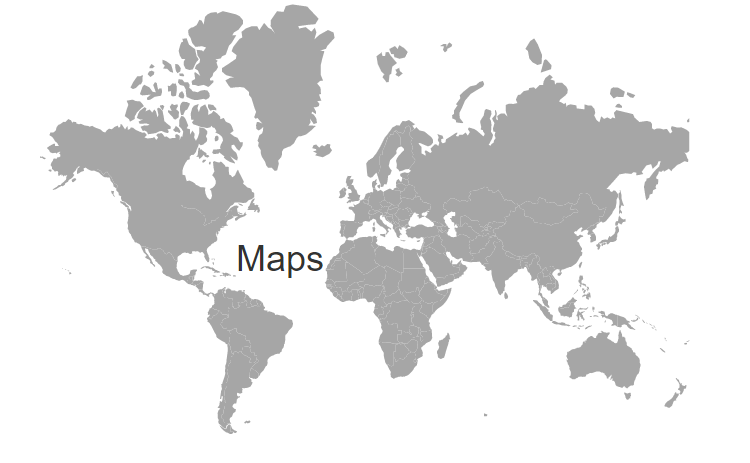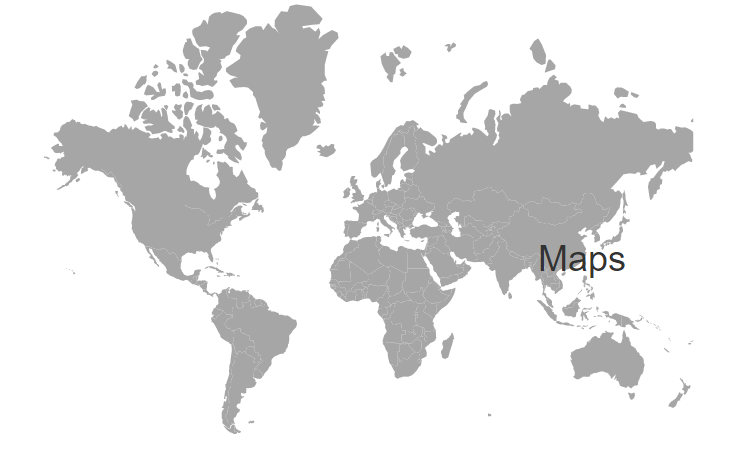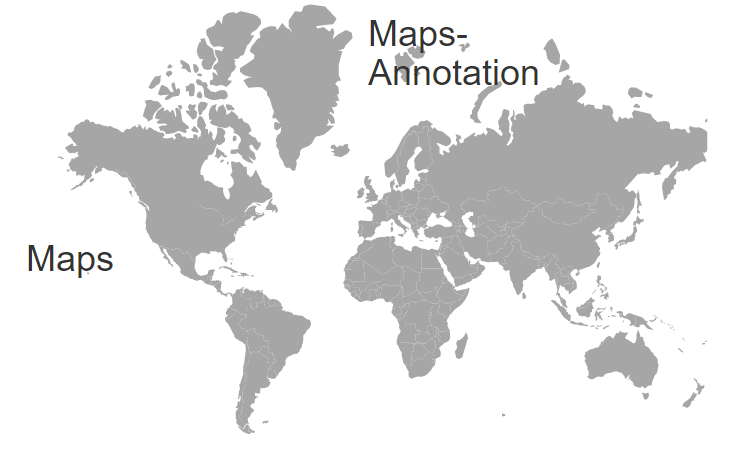How can I help you?
Annotations in ASP.NET MVC Maps Component
30 Sep 20229 minutes to read
Annotations are used to mark the specific area of interest in the Maps with texts, shapes, or images. Any number of annotations can be added to the Maps component.
Annotation
By using the Content property of MapsAnnotation, text content or id of an element or an HTML string can be specified to render a new HTML element in Maps.
@using Syncfusion.EJ2.Maps;
@using Syncfusion.EJ2;
@Html.EJS().Maps("maps").Annotations(new List<Syncfusion.EJ2.Maps.MapsAnnotation>{
new Syncfusion.EJ2.Maps.MapsAnnotation
{
Content = "<div id='annotation' style='display:none'><img src=''~/App_Data/ballon.png'></div>",
X = "0%",
Y = "50%",
}
}).Layers(layer =>
{
layer.ShapeData(ViewBag.worldmap).Add();
}).Render()using System;
using System.Collections.Generic;
using System.Diagnostics;
using System.Linq;
using System.Threading.Tasks;
using Microsoft.AspNetCore.Mvc;
using EJ2_Core_Application.Models;
using Newtonsoft.Json;
namespace EJ2_Core_Application.Controllers
{
public class HomeController : Controller
{
public IActionResult Index()
{
ViewBag.worldmap = GetWorldMap();
return View();
}
public object GetWorldMap()
{
string allText = System.IO.File.ReadAllText("./wwwroot/scripts/MapsData/WorldMap.js");
return JsonConvert.DeserializeObject(allText);
}
}
}Annotation customization
Changing the z-index
The stack order of an annotation element can be changed using the ZIndex property in the MapsAnnotation.
@using Syncfusion.EJ2.Maps;
@using Syncfusion.EJ2;
@Html.EJS().Maps("maps").Annotations(new List<Syncfusion.EJ2.Maps.MapsAnnotation>{
new Syncfusion.EJ2.Maps.MapsAnnotation
{
Content = "<div id='first'><h1>Maps</h1></div>",
X = "20%",
Y = "50%",
ZIndex = "-1"
}
}).Layers(layer =>
{
layer.ShapeData(ViewBag.worldmap).Add();
}).Render()using System;
using System.Collections.Generic;
using System.Diagnostics;
using System.Linq;
using System.Threading.Tasks;
using Microsoft.AspNetCore.Mvc;
using EJ2_Core_Application.Models;
using Newtonsoft.Json;
namespace EJ2_Core_Application.Controllers
{
public class HomeController : Controller
{
public IActionResult Index()
{
ViewBag.worldmap = GetWorldMap();
return View();
}
public object GetWorldMap()
{
string allText = System.IO.File.ReadAllText("./wwwroot/scripts/MapsData/WorldMap.js");
return JsonConvert.DeserializeObject(allText);
}
}
}Positioning an annotation
Annotations can be placed anywhere in the Maps by specifying pixel or percentage values to the X and Y properties in the MapsAnnotation.
@using Syncfusion.EJ2.Maps;
@using Syncfusion.EJ2;
@Html.EJS().Maps("maps").Annotations(new List<Syncfusion.EJ2.Maps.MapsAnnotation>{
new Syncfusion.EJ2.Maps.MapsAnnotation
{
Content = "<div id='first'><h1>Maps</h1></div>",
X = "40%",
Y = "50%",
ZIndex = "-1"
}
}).Layers(layer =>
{
layer.ShapeData(ViewBag.worldmap).Add();
}).Render()using System;
using System.Collections.Generic;
using System.Diagnostics;
using System.Linq;
using System.Threading.Tasks;
using Microsoft.AspNetCore.Mvc;
using EJ2_Core_Application.Models;
using Newtonsoft.Json;
namespace EJ2_Core_Application.Controllers
{
public class HomeController : Controller
{
public IActionResult Index()
{
ViewBag.worldmap = GetWorldMap();
return View();
}
public object GetWorldMap()
{
string allText = System.IO.File.ReadAllText("./wwwroot/scripts/MapsData/WorldMap.js");
return JsonConvert.DeserializeObject(allText);
}
}
}Alignment of an annotation
Annotations can be aligned using the HorizontalAlignment and VerticalAlignment properties in the MapsAnnotation. The possible values can be Center, Far, Near and None.
@using Syncfusion.EJ2.Maps;
@using Syncfusion.EJ2;
@Html.EJS().Maps("maps").Annotations(new List<Syncfusion.EJ2.Maps.MapsAnnotation>{
new Syncfusion.EJ2.Maps.MapsAnnotation
{
Content = "<div id='first'><h1>Maps</h1></div>",
X = "20%",
Y = "50%",
ZIndex = "-1",
HorizontalAlignment = AnnotationAlignment.Center
}
}).Layers(layer =>
{
layer.ShapeData(ViewBag.worldmap).Add();
}).Render()using System;
using System.Collections.Generic;
using System.Diagnostics;
using System.Linq;
using System.Threading.Tasks;
using Microsoft.AspNetCore.Mvc;
using EJ2_Core_Application.Models;
using Newtonsoft.Json;
namespace EJ2_Core_Application.Controllers
{
public class HomeController : Controller
{
public IActionResult Index()
{
ViewBag.world_map = GetWorldMap();
return View();
}
public object GetWorldMap()
{
string allText = System.IO.File.ReadAllText("./wwwroot/scripts/MapsData/WorldMap.js");
return JsonConvert.DeserializeObject(allText);
}
}
}Multiple Annotation
Multiple annotations can be added to the Maps by adding Multiple MapsAnnotation in the MapsAnnotations and customization for the annotations can be done with the MapsAnnotation.
@using Syncfusion.EJ2.Maps;
@using Syncfusion.EJ2;
@Html.EJS().Maps("maps").Annotations(new List<Syncfusion.EJ2.Maps.MapsAnnotation>{
new Syncfusion.EJ2.Maps.MapsAnnotation
{
Content = "<div id='first'><h1>Maps</h1></div>",
X = "50%",
Y = "0%",
ZIndex = "-1"
},
new Syncfusion.EJ2.Maps.MapsAnnotation {
Content = "<div id='first'><h1>Maps-Annotation</h1></div>",
X = "20%",
Y = "50%",
ZIndex = "-1"
}
}).Layers(layer =>
{
layer.ShapeData(ViewBag.worldmap).Add();
}).Render()using System;
using System.Collections.Generic;
using System.Diagnostics;
using System.Linq;
using System.Threading.Tasks;
using Microsoft.AspNetCore.Mvc;
using EJ2_Core_Application.Models;
using Newtonsoft.Json;
namespace EJ2_Core_Application.Controllers
{
public class HomeController : Controller
{
public IActionResult Index()
{
ViewBag.worldmap = GetWorldMap();
return View();
}
public object GetWorldMap()
{
string allText = System.IO.File.ReadAllText("./wwwroot/scripts/MapsData/WorldMap.js");
return JsonConvert.DeserializeObject(allText);
}
}
}



